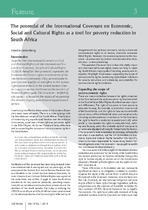| dc.contributor.author | Sandra, Liebenberg | |
| dc.date.accessioned | 2019-10-07T10:00:01Z | |
| dc.date.available | 2019-10-07T10:00:01Z | |
| dc.date.issued | 2014 | |
| dc.identifier.citation | Liebenberg, S. 2014. The potential of the International Covenant on Economic, Social and Cultural Rights as a tool for poverty reduction in South Africa. ESR Review. 15/1, 1-5 | en_US |
| dc.identifier.uri | http://hdl.handle.net/10566/4986 | |
| dc.description.abstract | Together the International Covenant on Civil and Political Rights and the International Covenant on Economic, Social and Cultural Rights
(ICESCR; hereafter ‘the Covenant’) represent the fundamental human rights commitments of the international community. They were adopted to give concrete legal force and effect to the human rights commitments in the United Nations Charter (1945) as well as the Universal Declaration of Human Rights (1948). The Covenant – ratified by 161 states – is based on the values of recognising the inherent dignity, potential and equality each person. | en_US |
| dc.language.iso | en | en_US |
| dc.publisher | ESR Review | en_US |
| dc.subject | South Africa | en_US |
| dc.subject | Poverty reduction | en_US |
| dc.subject | Socio-economic rights | en_US |
| dc.subject | Rights-based indicators | en_US |
| dc.subject | International Covenant on Economic, Social and Cultural Rights | en_US |
| dc.title | The potential of the International Covenant on Economic, Social and Cultural Rights as a tool for poverty reduction in South Africa | en_US |
| dc.type | Article | en_US |

